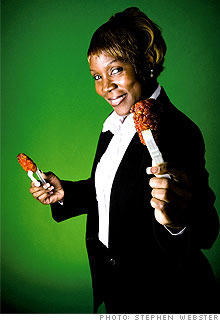After the Wal-Mart deal
An entrepreneur lands distribution with Wal-Mart - then learns that breaking into big retail is just the start of her sales work.
COLUMBUS (FORTUNE Small Business) -- I became an inventor while working two jobs and taking night classes in Columbus. Every Monday, to reward my efforts, I'd treat myself to barbecued Buffalo wings - extra-saucy ones - for dinner.
One night, as I was getting ready to eat my messy wings, I hesitated. I looked at the wings and then at my manicured fingernails. I thought, "There has to be a better way." That's when I came up with the idea of using small plastic tongs to eat wings.
After designing the product in 2005, I hired a local attorney and applied for a patent. I named my company Utensils, found a manufacturer, and built a website. With no advisors, I didn't know how to market the tongs. I was still building my business at night after work.
One day, during my lunch break, I ran to Wal-Mart (WMT, Fortune 500) to buy creamer for my office. When I walked by the registers, I noticed four employees wearing suits and Wal-Mart nametags. I passed them and then froze - I remembered that I had my wing tongs in my purse (I carry them everywhere).
I turned back, walked up to them, held up my tongs, and asked who could help me get my product into Wal-Mart. A store manager signed the papers that let me submit my supplier application.
At my first meeting with Wal-Mart executives, they were impressed that I'd already made the product, which they thought filled a market gap. Three months later my wing tongs were on the shelves of seven Wal-Mart stores in the Columbus area.
After the December 2005 rollout, I was thrilled: My tongs were in America's biggest store. I left messages with Wal-Mart's regional office to check on my product's progress but didn't hear back. So I figured I should be hands-off. I ignored the tongs and went to work every day, hoping I'd get word of a reorder. I expected a call, a fax, anything - but got absolutely nothing. A year passed, and my tongs were dead in the water.
At the start of 2007, I got a mass e-mail from Wal-Mart to female entrepreneurs. It set me off. I put my questions and concerns about my tongs into a response. To my surprise, I got a reply from Wal-Mart's main office and eventually obtained a meeting at the company's Bentonville, Ark., headquarters to discuss my wing tongs with the national housewares buyer.
From that point on, I became proactive.
I began regularly visiting stores to talk to managers about product placement and my tongs' progress. Instead of waiting for people to find my product, today I write hundreds of e-mails and letters to potential new retail outlets, such as home stores, and to other possible distributors - if your restaurant sells wings, I've probably contacted you.
I now know that I'm my best salesperson, not Wal-Mart.
Being hands-on has gotten my wing tongs noticed. A few months ago my product was picked up by Kroger (KR, Fortune 500)'s and put in 150 stores. The added exposure should boost annual sales, which were almost $50,000 in 2007.
These days I'm as involved as possible: I recently walked into a Kroger's and saw my tongs, which sell for $3.50, displayed in the meat section. I had them moved and placed near the barbecue sauce, where they're a better impulse buy. As an entrepreneur, you have to do more than bring a product to market: You have to make sure it succeeds. ![]()
Saying no to low-cost offshoring
Finding new clients locally
Targeting local prospects for direct marketing
-
The Cheesecake Factory created smaller portions to survive the downturn. Play
-
A breeder of award-winning marijuana seeds is following the money and heading to the U.S. More
-
Most small businesses die within five years, but Amish businesses have a survival rate north of 90%. More
-
The 10 most popular franchise brands over the past decade -- and their failure rates. More
-
These firms are the last left in America making iconic products now in their twilight. More









